University Case Study: Individual Determinant of Health (PHE1IDH)
VerifiedAdded on 2022/10/11
|8
|2182
|15
Case Study
AI Summary
This case study examines a teenager, Lauren, presenting behavioral symptoms linked to alcohol consumption, including anxiety, irritability, and lethargy. The case explores the role of her general physician, Rob, who employs a holistic approach to understand her issues, recommending exercise, medication adherence, and reduced alcohol intake. The analysis critiques Rob's recommendations, highlighting areas for improvement such as patient education and confidentiality. The study further delves into theoretical techniques like Cognitive Behavioral Therapy and Motivational Enhancement Therapy as potential interventions for Lauren's alcohol abuse, emphasizing the importance of addressing underlying issues and promoting motivation for recovery. The case underscores the impact of family dynamics and the need for a comprehensive approach to address the individual determinants of health.

0Running Head: INDIVIDUAL DETERMINANT OF HEALTH
Individual Determinant of Health
Author Name
University Name
Author Notes
Individual Determinant of Health
Author Name
University Name
Author Notes
Paraphrase This Document
Need a fresh take? Get an instant paraphrase of this document with our AI Paraphraser
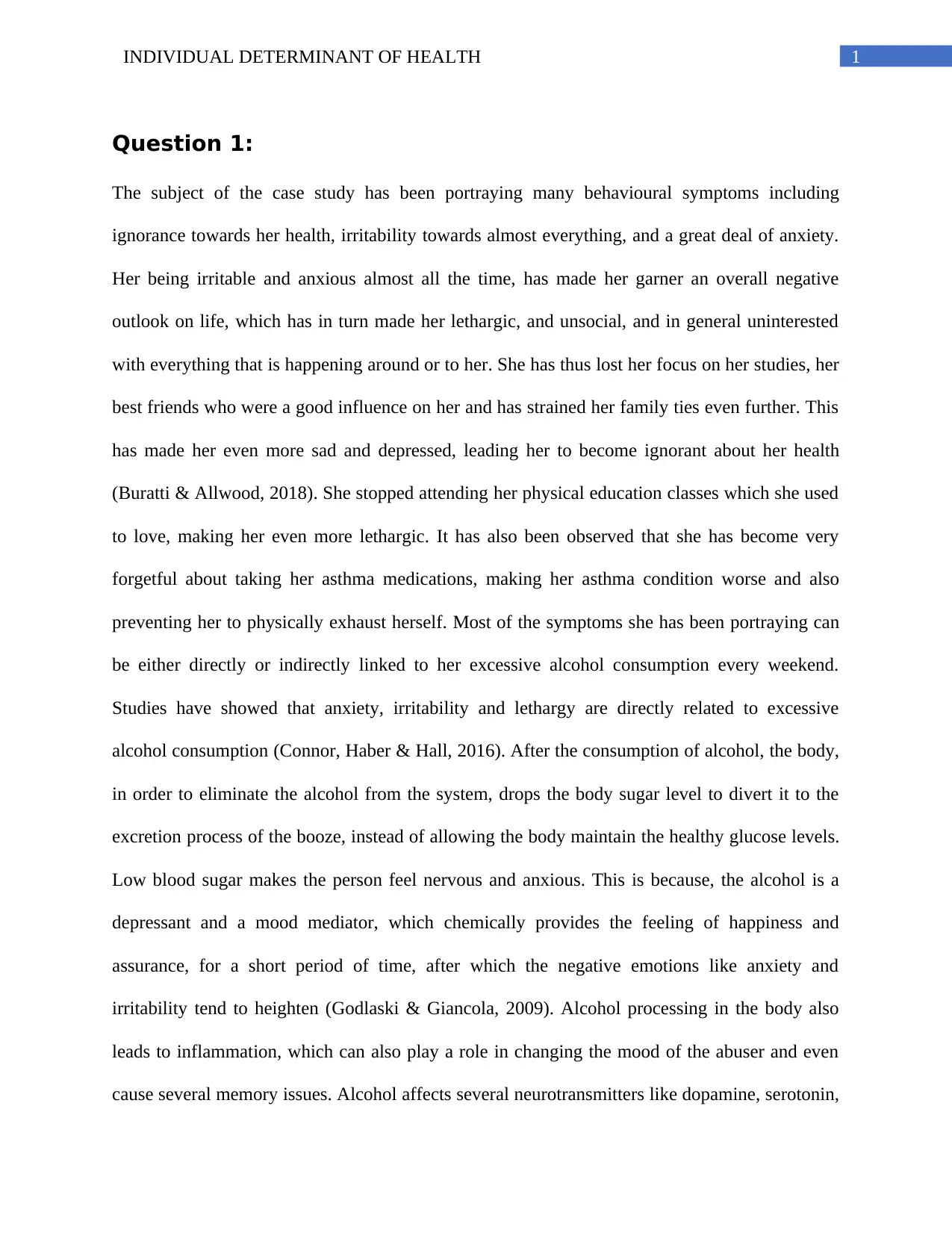
1INDIVIDUAL DETERMINANT OF HEALTH
Question 1:
The subject of the case study has been portraying many behavioural symptoms including
ignorance towards her health, irritability towards almost everything, and a great deal of anxiety.
Her being irritable and anxious almost all the time, has made her garner an overall negative
outlook on life, which has in turn made her lethargic, and unsocial, and in general uninterested
with everything that is happening around or to her. She has thus lost her focus on her studies, her
best friends who were a good influence on her and has strained her family ties even further. This
has made her even more sad and depressed, leading her to become ignorant about her health
(Buratti & Allwood, 2018). She stopped attending her physical education classes which she used
to love, making her even more lethargic. It has also been observed that she has become very
forgetful about taking her asthma medications, making her asthma condition worse and also
preventing her to physically exhaust herself. Most of the symptoms she has been portraying can
be either directly or indirectly linked to her excessive alcohol consumption every weekend.
Studies have showed that anxiety, irritability and lethargy are directly related to excessive
alcohol consumption (Connor, Haber & Hall, 2016). After the consumption of alcohol, the body,
in order to eliminate the alcohol from the system, drops the body sugar level to divert it to the
excretion process of the booze, instead of allowing the body maintain the healthy glucose levels.
Low blood sugar makes the person feel nervous and anxious. This is because, the alcohol is a
depressant and a mood mediator, which chemically provides the feeling of happiness and
assurance, for a short period of time, after which the negative emotions like anxiety and
irritability tend to heighten (Godlaski & Giancola, 2009). Alcohol processing in the body also
leads to inflammation, which can also play a role in changing the mood of the abuser and even
cause several memory issues. Alcohol affects several neurotransmitters like dopamine, serotonin,
Question 1:
The subject of the case study has been portraying many behavioural symptoms including
ignorance towards her health, irritability towards almost everything, and a great deal of anxiety.
Her being irritable and anxious almost all the time, has made her garner an overall negative
outlook on life, which has in turn made her lethargic, and unsocial, and in general uninterested
with everything that is happening around or to her. She has thus lost her focus on her studies, her
best friends who were a good influence on her and has strained her family ties even further. This
has made her even more sad and depressed, leading her to become ignorant about her health
(Buratti & Allwood, 2018). She stopped attending her physical education classes which she used
to love, making her even more lethargic. It has also been observed that she has become very
forgetful about taking her asthma medications, making her asthma condition worse and also
preventing her to physically exhaust herself. Most of the symptoms she has been portraying can
be either directly or indirectly linked to her excessive alcohol consumption every weekend.
Studies have showed that anxiety, irritability and lethargy are directly related to excessive
alcohol consumption (Connor, Haber & Hall, 2016). After the consumption of alcohol, the body,
in order to eliminate the alcohol from the system, drops the body sugar level to divert it to the
excretion process of the booze, instead of allowing the body maintain the healthy glucose levels.
Low blood sugar makes the person feel nervous and anxious. This is because, the alcohol is a
depressant and a mood mediator, which chemically provides the feeling of happiness and
assurance, for a short period of time, after which the negative emotions like anxiety and
irritability tend to heighten (Godlaski & Giancola, 2009). Alcohol processing in the body also
leads to inflammation, which can also play a role in changing the mood of the abuser and even
cause several memory issues. Alcohol affects several neurotransmitters like dopamine, serotonin,
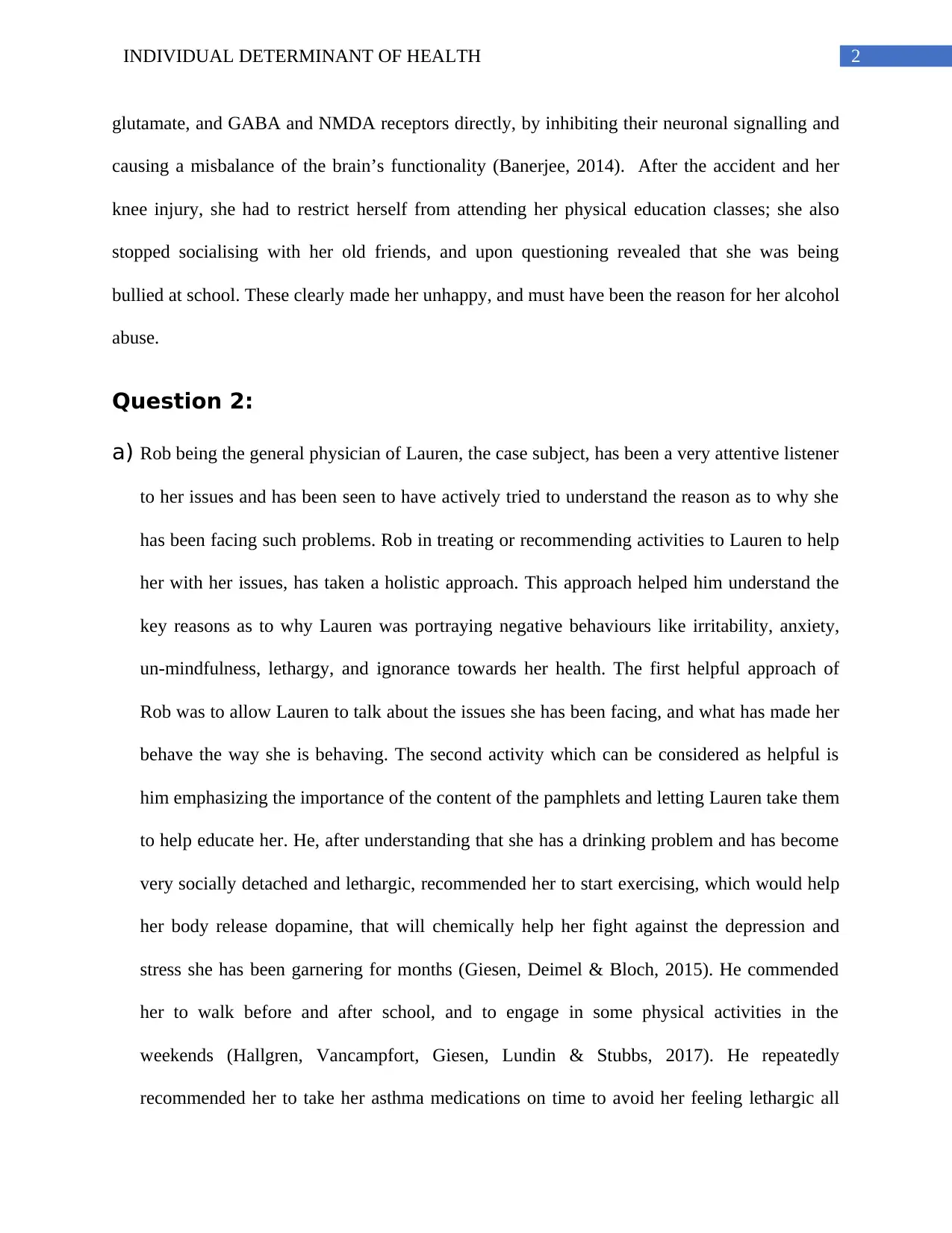
2INDIVIDUAL DETERMINANT OF HEALTH
glutamate, and GABA and NMDA receptors directly, by inhibiting their neuronal signalling and
causing a misbalance of the brain’s functionality (Banerjee, 2014). After the accident and her
knee injury, she had to restrict herself from attending her physical education classes; she also
stopped socialising with her old friends, and upon questioning revealed that she was being
bullied at school. These clearly made her unhappy, and must have been the reason for her alcohol
abuse.
Question 2:
a) Rob being the general physician of Lauren, the case subject, has been a very attentive listener
to her issues and has been seen to have actively tried to understand the reason as to why she
has been facing such problems. Rob in treating or recommending activities to Lauren to help
her with her issues, has taken a holistic approach. This approach helped him understand the
key reasons as to why Lauren was portraying negative behaviours like irritability, anxiety,
un-mindfulness, lethargy, and ignorance towards her health. The first helpful approach of
Rob was to allow Lauren to talk about the issues she has been facing, and what has made her
behave the way she is behaving. The second activity which can be considered as helpful is
him emphasizing the importance of the content of the pamphlets and letting Lauren take them
to help educate her. He, after understanding that she has a drinking problem and has become
very socially detached and lethargic, recommended her to start exercising, which would help
her body release dopamine, that will chemically help her fight against the depression and
stress she has been garnering for months (Giesen, Deimel & Bloch, 2015). He commended
her to walk before and after school, and to engage in some physical activities in the
weekends (Hallgren, Vancampfort, Giesen, Lundin & Stubbs, 2017). He repeatedly
recommended her to take her asthma medications on time to avoid her feeling lethargic all
glutamate, and GABA and NMDA receptors directly, by inhibiting their neuronal signalling and
causing a misbalance of the brain’s functionality (Banerjee, 2014). After the accident and her
knee injury, she had to restrict herself from attending her physical education classes; she also
stopped socialising with her old friends, and upon questioning revealed that she was being
bullied at school. These clearly made her unhappy, and must have been the reason for her alcohol
abuse.
Question 2:
a) Rob being the general physician of Lauren, the case subject, has been a very attentive listener
to her issues and has been seen to have actively tried to understand the reason as to why she
has been facing such problems. Rob in treating or recommending activities to Lauren to help
her with her issues, has taken a holistic approach. This approach helped him understand the
key reasons as to why Lauren was portraying negative behaviours like irritability, anxiety,
un-mindfulness, lethargy, and ignorance towards her health. The first helpful approach of
Rob was to allow Lauren to talk about the issues she has been facing, and what has made her
behave the way she is behaving. The second activity which can be considered as helpful is
him emphasizing the importance of the content of the pamphlets and letting Lauren take them
to help educate her. He, after understanding that she has a drinking problem and has become
very socially detached and lethargic, recommended her to start exercising, which would help
her body release dopamine, that will chemically help her fight against the depression and
stress she has been garnering for months (Giesen, Deimel & Bloch, 2015). He commended
her to walk before and after school, and to engage in some physical activities in the
weekends (Hallgren, Vancampfort, Giesen, Lundin & Stubbs, 2017). He repeatedly
recommended her to take her asthma medications on time to avoid her feeling lethargic all
⊘ This is a preview!⊘
Do you want full access?
Subscribe today to unlock all pages.

Trusted by 1+ million students worldwide
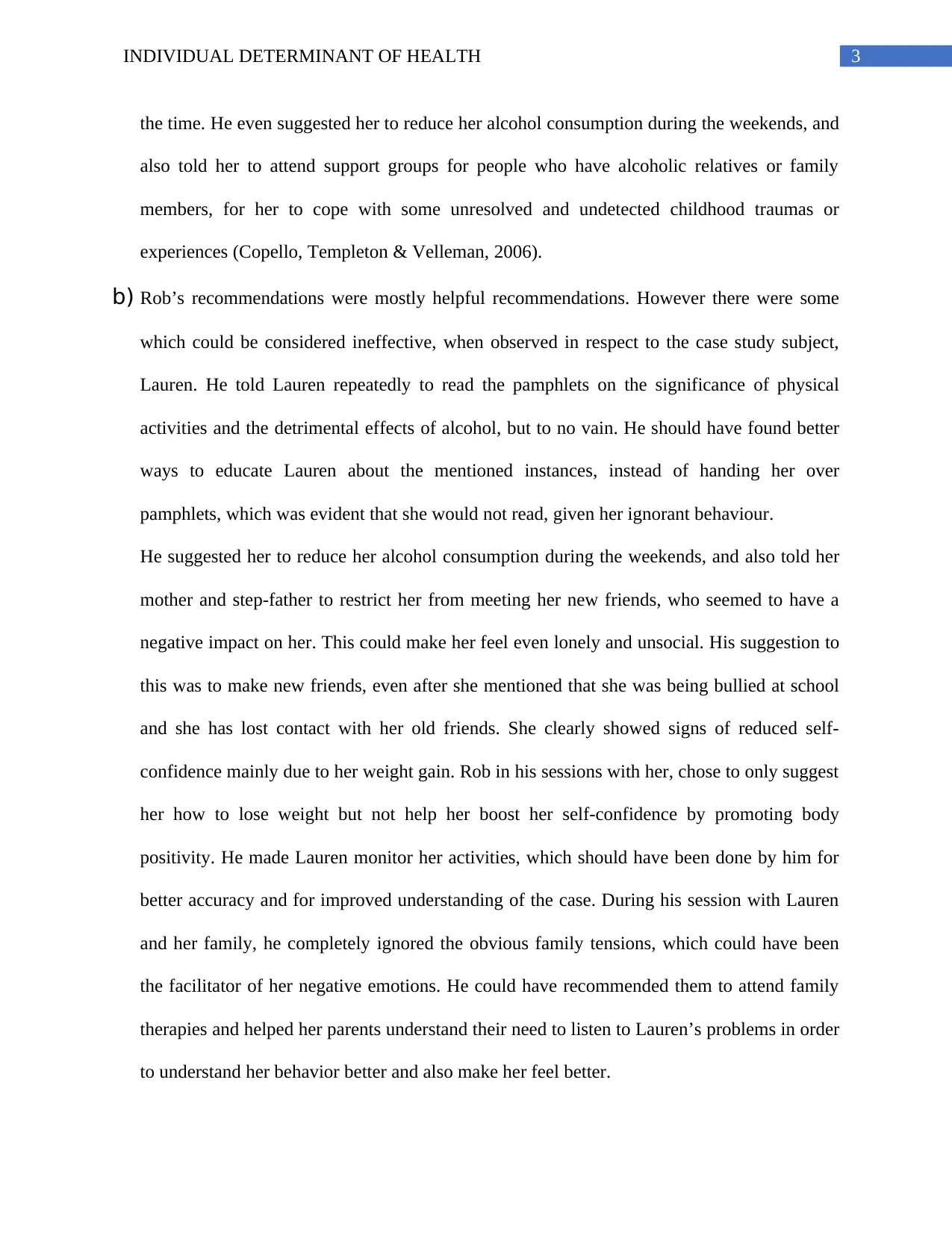
3INDIVIDUAL DETERMINANT OF HEALTH
the time. He even suggested her to reduce her alcohol consumption during the weekends, and
also told her to attend support groups for people who have alcoholic relatives or family
members, for her to cope with some unresolved and undetected childhood traumas or
experiences (Copello, Templeton & Velleman, 2006).
b) Rob’s recommendations were mostly helpful recommendations. However there were some
which could be considered ineffective, when observed in respect to the case study subject,
Lauren. He told Lauren repeatedly to read the pamphlets on the significance of physical
activities and the detrimental effects of alcohol, but to no vain. He should have found better
ways to educate Lauren about the mentioned instances, instead of handing her over
pamphlets, which was evident that she would not read, given her ignorant behaviour.
He suggested her to reduce her alcohol consumption during the weekends, and also told her
mother and step-father to restrict her from meeting her new friends, who seemed to have a
negative impact on her. This could make her feel even lonely and unsocial. His suggestion to
this was to make new friends, even after she mentioned that she was being bullied at school
and she has lost contact with her old friends. She clearly showed signs of reduced self-
confidence mainly due to her weight gain. Rob in his sessions with her, chose to only suggest
her how to lose weight but not help her boost her self-confidence by promoting body
positivity. He made Lauren monitor her activities, which should have been done by him for
better accuracy and for improved understanding of the case. During his session with Lauren
and her family, he completely ignored the obvious family tensions, which could have been
the facilitator of her negative emotions. He could have recommended them to attend family
therapies and helped her parents understand their need to listen to Lauren’s problems in order
to understand her behavior better and also make her feel better.
the time. He even suggested her to reduce her alcohol consumption during the weekends, and
also told her to attend support groups for people who have alcoholic relatives or family
members, for her to cope with some unresolved and undetected childhood traumas or
experiences (Copello, Templeton & Velleman, 2006).
b) Rob’s recommendations were mostly helpful recommendations. However there were some
which could be considered ineffective, when observed in respect to the case study subject,
Lauren. He told Lauren repeatedly to read the pamphlets on the significance of physical
activities and the detrimental effects of alcohol, but to no vain. He should have found better
ways to educate Lauren about the mentioned instances, instead of handing her over
pamphlets, which was evident that she would not read, given her ignorant behaviour.
He suggested her to reduce her alcohol consumption during the weekends, and also told her
mother and step-father to restrict her from meeting her new friends, who seemed to have a
negative impact on her. This could make her feel even lonely and unsocial. His suggestion to
this was to make new friends, even after she mentioned that she was being bullied at school
and she has lost contact with her old friends. She clearly showed signs of reduced self-
confidence mainly due to her weight gain. Rob in his sessions with her, chose to only suggest
her how to lose weight but not help her boost her self-confidence by promoting body
positivity. He made Lauren monitor her activities, which should have been done by him for
better accuracy and for improved understanding of the case. During his session with Lauren
and her family, he completely ignored the obvious family tensions, which could have been
the facilitator of her negative emotions. He could have recommended them to attend family
therapies and helped her parents understand their need to listen to Lauren’s problems in order
to understand her behavior better and also make her feel better.
Paraphrase This Document
Need a fresh take? Get an instant paraphrase of this document with our AI Paraphraser
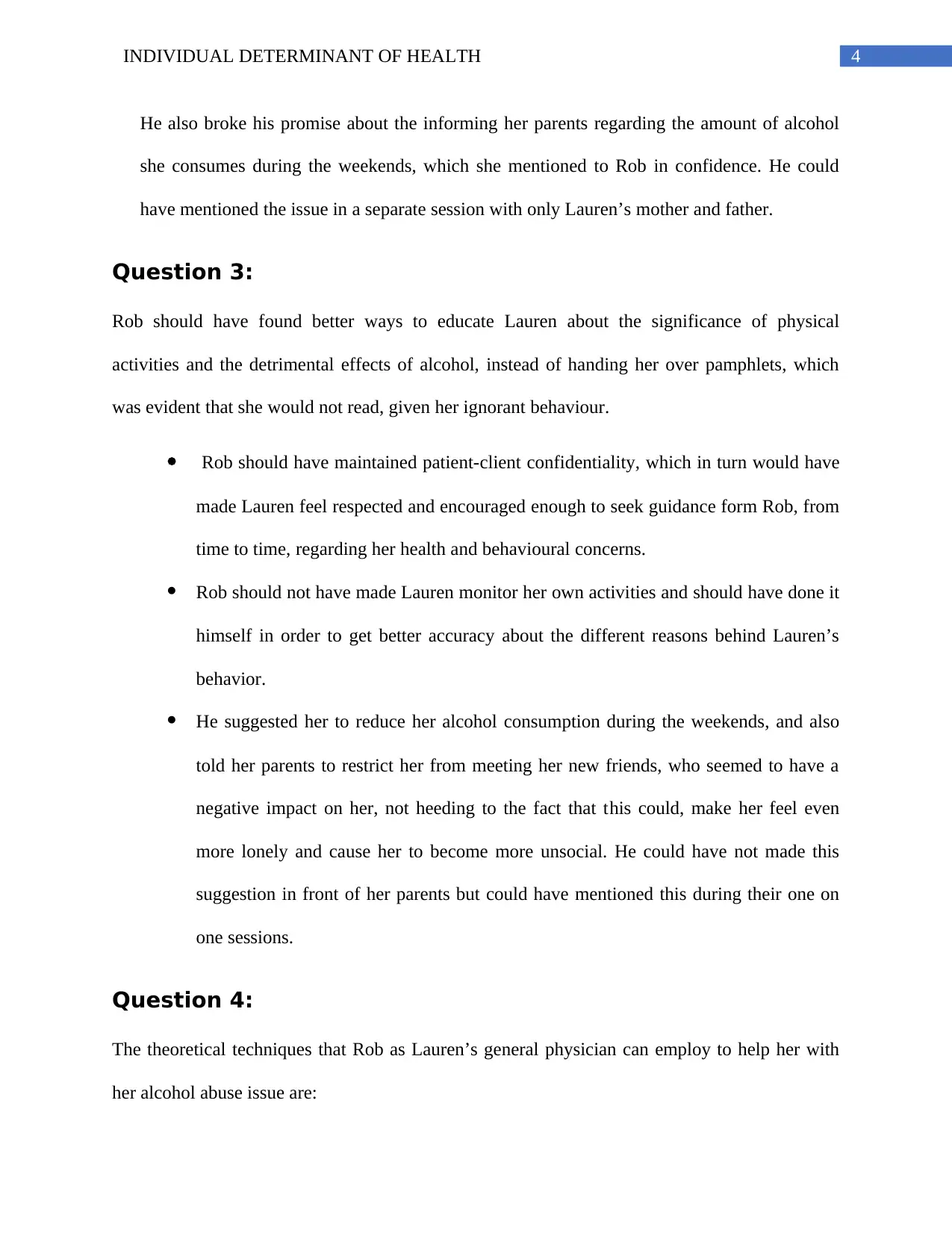
4INDIVIDUAL DETERMINANT OF HEALTH
He also broke his promise about the informing her parents regarding the amount of alcohol
she consumes during the weekends, which she mentioned to Rob in confidence. He could
have mentioned the issue in a separate session with only Lauren’s mother and father.
Question 3:
Rob should have found better ways to educate Lauren about the significance of physical
activities and the detrimental effects of alcohol, instead of handing her over pamphlets, which
was evident that she would not read, given her ignorant behaviour.
Rob should have maintained patient-client confidentiality, which in turn would have
made Lauren feel respected and encouraged enough to seek guidance form Rob, from
time to time, regarding her health and behavioural concerns.
Rob should not have made Lauren monitor her own activities and should have done it
himself in order to get better accuracy about the different reasons behind Lauren’s
behavior.
He suggested her to reduce her alcohol consumption during the weekends, and also
told her parents to restrict her from meeting her new friends, who seemed to have a
negative impact on her, not heeding to the fact that this could, make her feel even
more lonely and cause her to become more unsocial. He could have not made this
suggestion in front of her parents but could have mentioned this during their one on
one sessions.
Question 4:
The theoretical techniques that Rob as Lauren’s general physician can employ to help her with
her alcohol abuse issue are:
He also broke his promise about the informing her parents regarding the amount of alcohol
she consumes during the weekends, which she mentioned to Rob in confidence. He could
have mentioned the issue in a separate session with only Lauren’s mother and father.
Question 3:
Rob should have found better ways to educate Lauren about the significance of physical
activities and the detrimental effects of alcohol, instead of handing her over pamphlets, which
was evident that she would not read, given her ignorant behaviour.
Rob should have maintained patient-client confidentiality, which in turn would have
made Lauren feel respected and encouraged enough to seek guidance form Rob, from
time to time, regarding her health and behavioural concerns.
Rob should not have made Lauren monitor her own activities and should have done it
himself in order to get better accuracy about the different reasons behind Lauren’s
behavior.
He suggested her to reduce her alcohol consumption during the weekends, and also
told her parents to restrict her from meeting her new friends, who seemed to have a
negative impact on her, not heeding to the fact that this could, make her feel even
more lonely and cause her to become more unsocial. He could have not made this
suggestion in front of her parents but could have mentioned this during their one on
one sessions.
Question 4:
The theoretical techniques that Rob as Lauren’s general physician can employ to help her with
her alcohol abuse issue are:
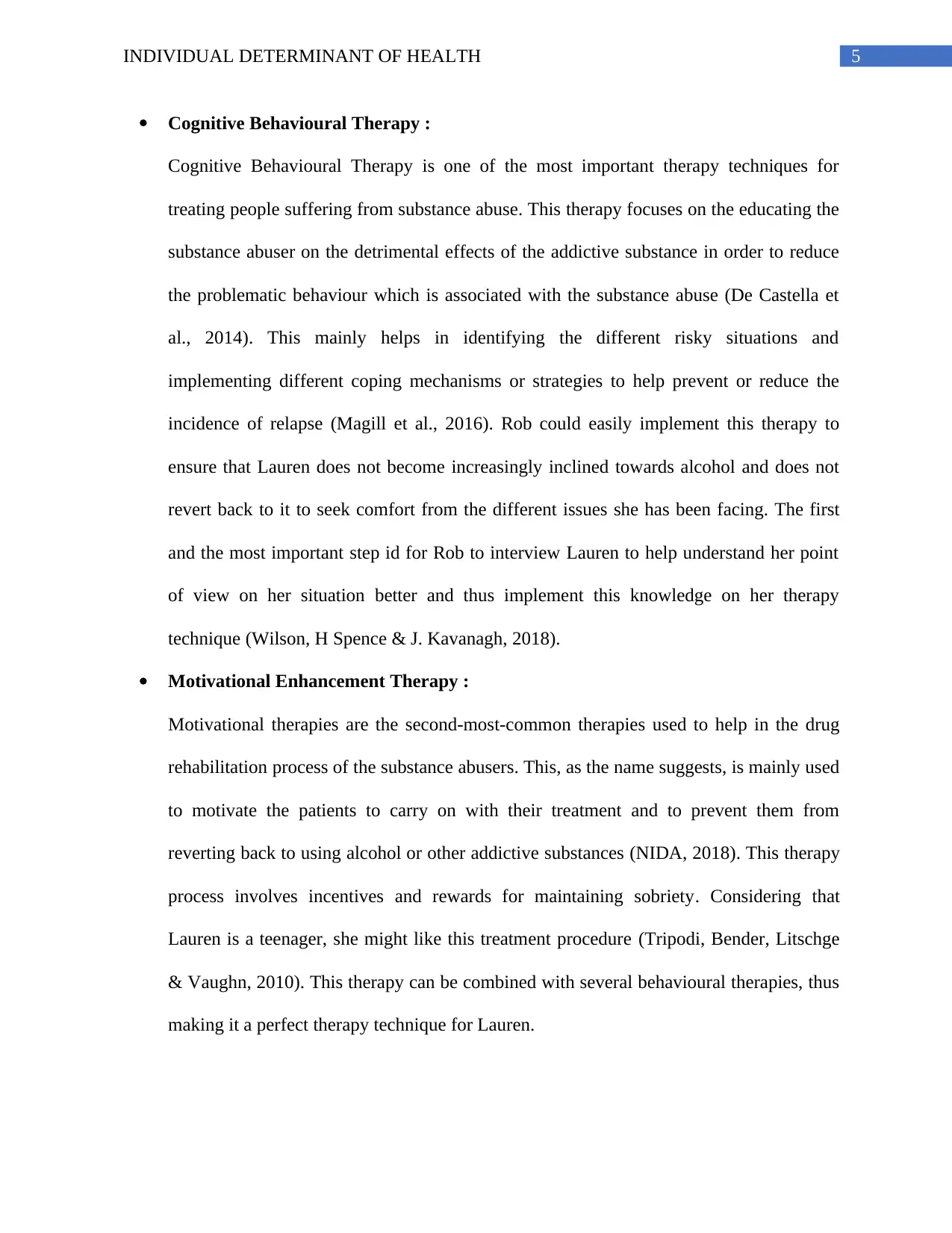
5INDIVIDUAL DETERMINANT OF HEALTH
Cognitive Behavioural Therapy :
Cognitive Behavioural Therapy is one of the most important therapy techniques for
treating people suffering from substance abuse. This therapy focuses on the educating the
substance abuser on the detrimental effects of the addictive substance in order to reduce
the problematic behaviour which is associated with the substance abuse (De Castella et
al., 2014). This mainly helps in identifying the different risky situations and
implementing different coping mechanisms or strategies to help prevent or reduce the
incidence of relapse (Magill et al., 2016). Rob could easily implement this therapy to
ensure that Lauren does not become increasingly inclined towards alcohol and does not
revert back to it to seek comfort from the different issues she has been facing. The first
and the most important step id for Rob to interview Lauren to help understand her point
of view on her situation better and thus implement this knowledge on her therapy
technique (Wilson, H Spence & J. Kavanagh, 2018).
Motivational Enhancement Therapy :
Motivational therapies are the second-most-common therapies used to help in the drug
rehabilitation process of the substance abusers. This, as the name suggests, is mainly used
to motivate the patients to carry on with their treatment and to prevent them from
reverting back to using alcohol or other addictive substances (NIDA, 2018). This therapy
process involves incentives and rewards for maintaining sobriety. Considering that
Lauren is a teenager, she might like this treatment procedure (Tripodi, Bender, Litschge
& Vaughn, 2010). This therapy can be combined with several behavioural therapies, thus
making it a perfect therapy technique for Lauren.
Cognitive Behavioural Therapy :
Cognitive Behavioural Therapy is one of the most important therapy techniques for
treating people suffering from substance abuse. This therapy focuses on the educating the
substance abuser on the detrimental effects of the addictive substance in order to reduce
the problematic behaviour which is associated with the substance abuse (De Castella et
al., 2014). This mainly helps in identifying the different risky situations and
implementing different coping mechanisms or strategies to help prevent or reduce the
incidence of relapse (Magill et al., 2016). Rob could easily implement this therapy to
ensure that Lauren does not become increasingly inclined towards alcohol and does not
revert back to it to seek comfort from the different issues she has been facing. The first
and the most important step id for Rob to interview Lauren to help understand her point
of view on her situation better and thus implement this knowledge on her therapy
technique (Wilson, H Spence & J. Kavanagh, 2018).
Motivational Enhancement Therapy :
Motivational therapies are the second-most-common therapies used to help in the drug
rehabilitation process of the substance abusers. This, as the name suggests, is mainly used
to motivate the patients to carry on with their treatment and to prevent them from
reverting back to using alcohol or other addictive substances (NIDA, 2018). This therapy
process involves incentives and rewards for maintaining sobriety. Considering that
Lauren is a teenager, she might like this treatment procedure (Tripodi, Bender, Litschge
& Vaughn, 2010). This therapy can be combined with several behavioural therapies, thus
making it a perfect therapy technique for Lauren.
⊘ This is a preview!⊘
Do you want full access?
Subscribe today to unlock all pages.

Trusted by 1+ million students worldwide
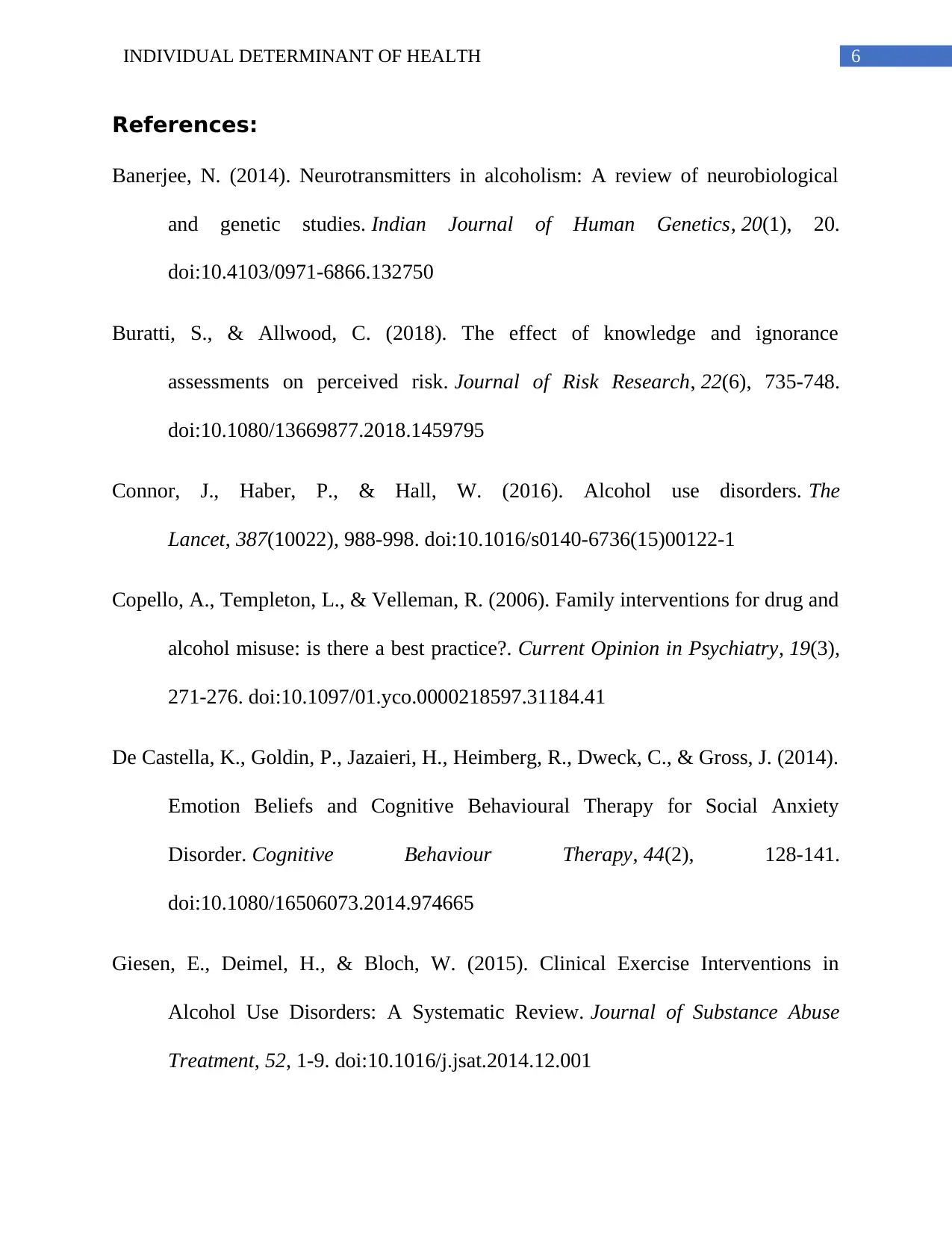
6INDIVIDUAL DETERMINANT OF HEALTH
References:
Banerjee, N. (2014). Neurotransmitters in alcoholism: A review of neurobiological
and genetic studies. Indian Journal of Human Genetics, 20(1), 20.
doi:10.4103/0971-6866.132750
Buratti, S., & Allwood, C. (2018). The effect of knowledge and ignorance
assessments on perceived risk. Journal of Risk Research, 22(6), 735-748.
doi:10.1080/13669877.2018.1459795
Connor, J., Haber, P., & Hall, W. (2016). Alcohol use disorders. The
Lancet, 387(10022), 988-998. doi:10.1016/s0140-6736(15)00122-1
Copello, A., Templeton, L., & Velleman, R. (2006). Family interventions for drug and
alcohol misuse: is there a best practice?. Current Opinion in Psychiatry, 19(3),
271-276. doi:10.1097/01.yco.0000218597.31184.41
De Castella, K., Goldin, P., Jazaieri, H., Heimberg, R., Dweck, C., & Gross, J. (2014).
Emotion Beliefs and Cognitive Behavioural Therapy for Social Anxiety
Disorder. Cognitive Behaviour Therapy, 44(2), 128-141.
doi:10.1080/16506073.2014.974665
Giesen, E., Deimel, H., & Bloch, W. (2015). Clinical Exercise Interventions in
Alcohol Use Disorders: A Systematic Review. Journal of Substance Abuse
Treatment, 52, 1-9. doi:10.1016/j.jsat.2014.12.001
References:
Banerjee, N. (2014). Neurotransmitters in alcoholism: A review of neurobiological
and genetic studies. Indian Journal of Human Genetics, 20(1), 20.
doi:10.4103/0971-6866.132750
Buratti, S., & Allwood, C. (2018). The effect of knowledge and ignorance
assessments on perceived risk. Journal of Risk Research, 22(6), 735-748.
doi:10.1080/13669877.2018.1459795
Connor, J., Haber, P., & Hall, W. (2016). Alcohol use disorders. The
Lancet, 387(10022), 988-998. doi:10.1016/s0140-6736(15)00122-1
Copello, A., Templeton, L., & Velleman, R. (2006). Family interventions for drug and
alcohol misuse: is there a best practice?. Current Opinion in Psychiatry, 19(3),
271-276. doi:10.1097/01.yco.0000218597.31184.41
De Castella, K., Goldin, P., Jazaieri, H., Heimberg, R., Dweck, C., & Gross, J. (2014).
Emotion Beliefs and Cognitive Behavioural Therapy for Social Anxiety
Disorder. Cognitive Behaviour Therapy, 44(2), 128-141.
doi:10.1080/16506073.2014.974665
Giesen, E., Deimel, H., & Bloch, W. (2015). Clinical Exercise Interventions in
Alcohol Use Disorders: A Systematic Review. Journal of Substance Abuse
Treatment, 52, 1-9. doi:10.1016/j.jsat.2014.12.001
Paraphrase This Document
Need a fresh take? Get an instant paraphrase of this document with our AI Paraphraser
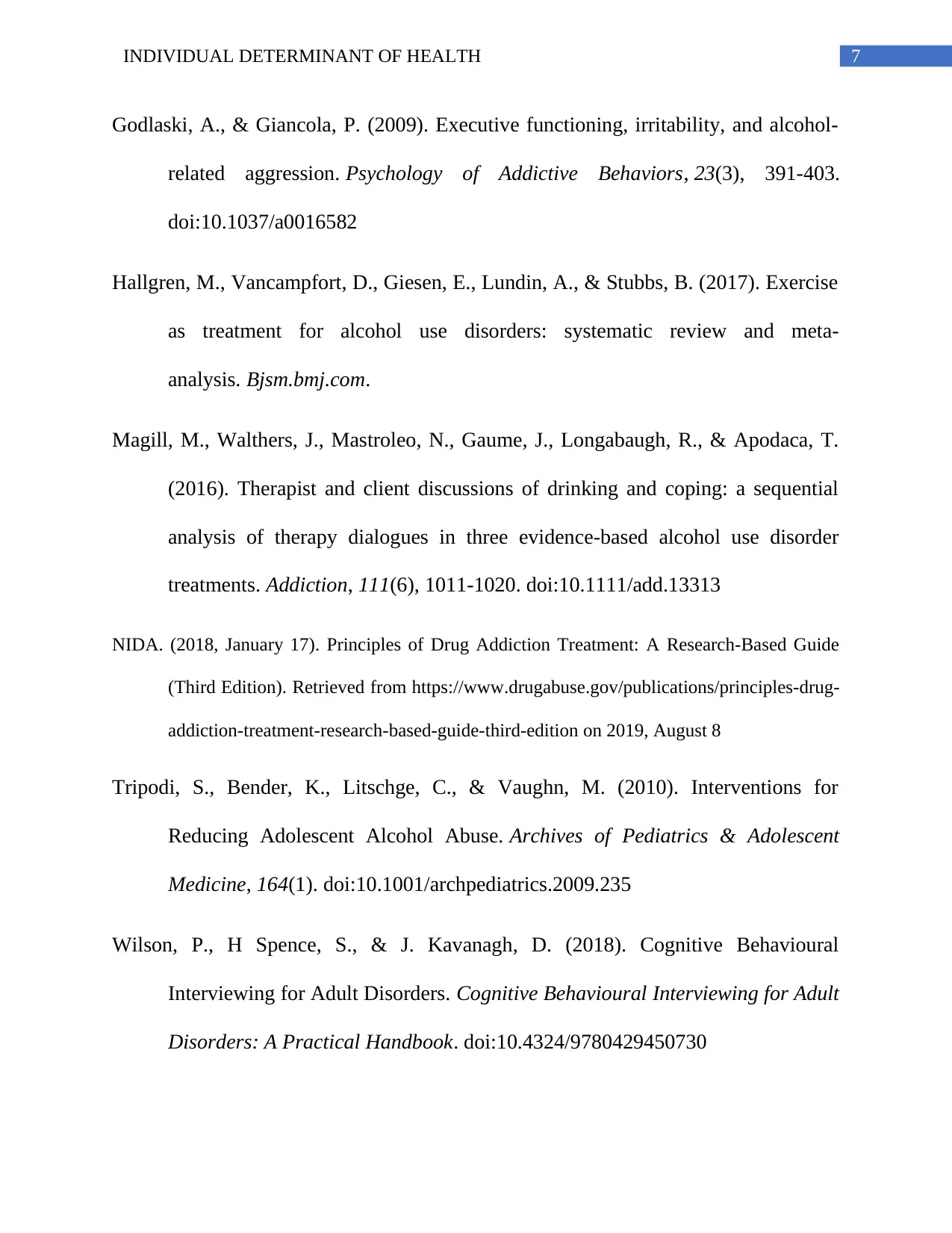
7INDIVIDUAL DETERMINANT OF HEALTH
Godlaski, A., & Giancola, P. (2009). Executive functioning, irritability, and alcohol-
related aggression. Psychology of Addictive Behaviors, 23(3), 391-403.
doi:10.1037/a0016582
Hallgren, M., Vancampfort, D., Giesen, E., Lundin, A., & Stubbs, B. (2017). Exercise
as treatment for alcohol use disorders: systematic review and meta-
analysis. Bjsm.bmj.com.
Magill, M., Walthers, J., Mastroleo, N., Gaume, J., Longabaugh, R., & Apodaca, T.
(2016). Therapist and client discussions of drinking and coping: a sequential
analysis of therapy dialogues in three evidence-based alcohol use disorder
treatments. Addiction, 111(6), 1011-1020. doi:10.1111/add.13313
NIDA. (2018, January 17). Principles of Drug Addiction Treatment: A Research-Based Guide
(Third Edition). Retrieved from https://www.drugabuse.gov/publications/principles-drug-
addiction-treatment-research-based-guide-third-edition on 2019, August 8
Tripodi, S., Bender, K., Litschge, C., & Vaughn, M. (2010). Interventions for
Reducing Adolescent Alcohol Abuse. Archives of Pediatrics & Adolescent
Medicine, 164(1). doi:10.1001/archpediatrics.2009.235
Wilson, P., H Spence, S., & J. Kavanagh, D. (2018). Cognitive Behavioural
Interviewing for Adult Disorders. Cognitive Behavioural Interviewing for Adult
Disorders: A Practical Handbook. doi:10.4324/9780429450730
Godlaski, A., & Giancola, P. (2009). Executive functioning, irritability, and alcohol-
related aggression. Psychology of Addictive Behaviors, 23(3), 391-403.
doi:10.1037/a0016582
Hallgren, M., Vancampfort, D., Giesen, E., Lundin, A., & Stubbs, B. (2017). Exercise
as treatment for alcohol use disorders: systematic review and meta-
analysis. Bjsm.bmj.com.
Magill, M., Walthers, J., Mastroleo, N., Gaume, J., Longabaugh, R., & Apodaca, T.
(2016). Therapist and client discussions of drinking and coping: a sequential
analysis of therapy dialogues in three evidence-based alcohol use disorder
treatments. Addiction, 111(6), 1011-1020. doi:10.1111/add.13313
NIDA. (2018, January 17). Principles of Drug Addiction Treatment: A Research-Based Guide
(Third Edition). Retrieved from https://www.drugabuse.gov/publications/principles-drug-
addiction-treatment-research-based-guide-third-edition on 2019, August 8
Tripodi, S., Bender, K., Litschge, C., & Vaughn, M. (2010). Interventions for
Reducing Adolescent Alcohol Abuse. Archives of Pediatrics & Adolescent
Medicine, 164(1). doi:10.1001/archpediatrics.2009.235
Wilson, P., H Spence, S., & J. Kavanagh, D. (2018). Cognitive Behavioural
Interviewing for Adult Disorders. Cognitive Behavioural Interviewing for Adult
Disorders: A Practical Handbook. doi:10.4324/9780429450730
1 out of 8
Related Documents
Your All-in-One AI-Powered Toolkit for Academic Success.
+13062052269
info@desklib.com
Available 24*7 on WhatsApp / Email
![[object Object]](/_next/static/media/star-bottom.7253800d.svg)
Unlock your academic potential
Copyright © 2020–2026 A2Z Services. All Rights Reserved. Developed and managed by ZUCOL.





